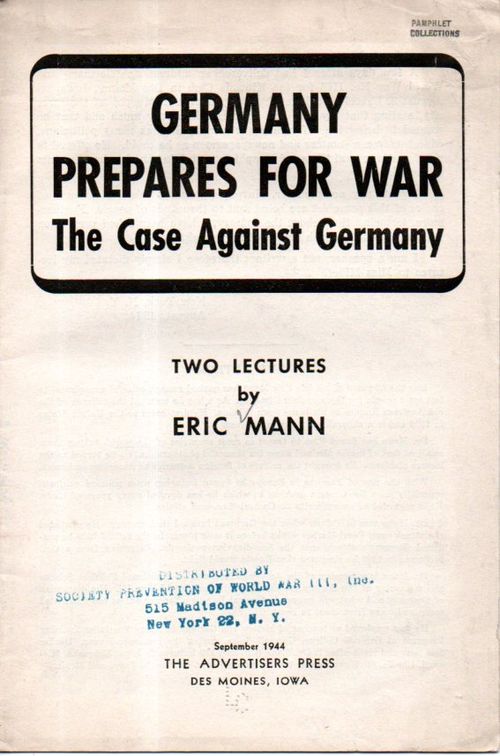JF Ptak Science Books Post 2152
 Eric Mann, a professor at NYU, wrote this unusual pamphlet towards the end of WWII, in the summer of 1944--the end was near but still there was the Ardennes to come and much more fighting, much more bombing, much more of everything. He wrote for the Society for the Prevention of World War III--which caused me to think of when it was that I first remember seeing a reference to "World War III/WWIII", and then the first use of World War II/Second World War, and World War I.
Eric Mann, a professor at NYU, wrote this unusual pamphlet towards the end of WWII, in the summer of 1944--the end was near but still there was the Ardennes to come and much more fighting, much more bombing, much more of everything. He wrote for the Society for the Prevention of World War III--which caused me to think of when it was that I first remember seeing a reference to "World War III/WWIII", and then the first use of World War II/Second World War, and World War I.
The first mention of the term "World War II" in non-fiction literature/reporting appeared not much earlier than this WWIII term, really--according to Scott Kaufman in The Chronicle,"World War II" appeared in the 31 December 1939 issue of the L.A. Times--just four years before this mention of the third world war. The Oxford English Dictionary locates another source that is slightly earlier; the first use in general is found in the sci-fi novel City of Endless Night in 1920. The term "First World War" predates the conflict itself (OED as 1909) but World War I seems to come into existence about half-way through the war. (The histories of these terms is a little complicated and deserving of their won post, but I think this gets the point across for now.)
This may be an extremely early use of the term "World War III". The term evidently comes up in the British contingency plans for the U.K. and U.S.A. to overtake the Soviet Union at the end of WWII in its Operation Unthinkable, but as that was a, well, secret plan, the WWIII stuff didn't seep out into public very much. "The Society for the Prevention of World War III" began in 1944, and launched its magazine in May of that year, so the seat if the term may actually come about at about that point.
The odd bit about WWIII in this case is that it is in context to the devastated Germany, and not with regard to the Soviet Union, the usual culprit for the initiator of the next Great War. The Society was voraciously opposed to very much leniency in the treatment of Germany post-war, wanting to dismantle the country stick-by-stick, so that it would be impossible for the Germans to launch any wars in the future.
Of course people would have had a difficult time seeing Germany in a Second World War just following the end of the First, that country badly tottering and chained out with reparations and stripped of major industries. But here we are with Mr. Mann foretelling a future war--another World War--begun by Germany while Germany was still very busily involved in destroying itself and millions of others in dragging out the war it was fighting in 1944.
There are reasons many and few and large and small supplied by Mr. Mann in support of his theory--one set of which, though, deserves some special attention. It was his contention that Hitler was seeding "German concentration camps" with "thousands of his most ardent followers" to infiltrate the Allied ranks with Sub Rosa agents taken in with camp survivors. HE maintained that there were dozens of thousands of young women being sexually trained for underground warfare; 60,000 young men being trained for underground warfare based largely on what occupied Allied countries were doing. And so on. These small bits--true or not--were certainly worth thinking about in terms of securing a lasting peace, but the Society's plans were overtaken nearly from the beginning of the end of the war, and then mostly abandoned following the introduction of the Marshall Plan in 1948.
I guess it would be worthwhile to look at the origin of "the war to end all wars", though I expect it to be of great antiquity--the idea if not the actual phrase.



Comments